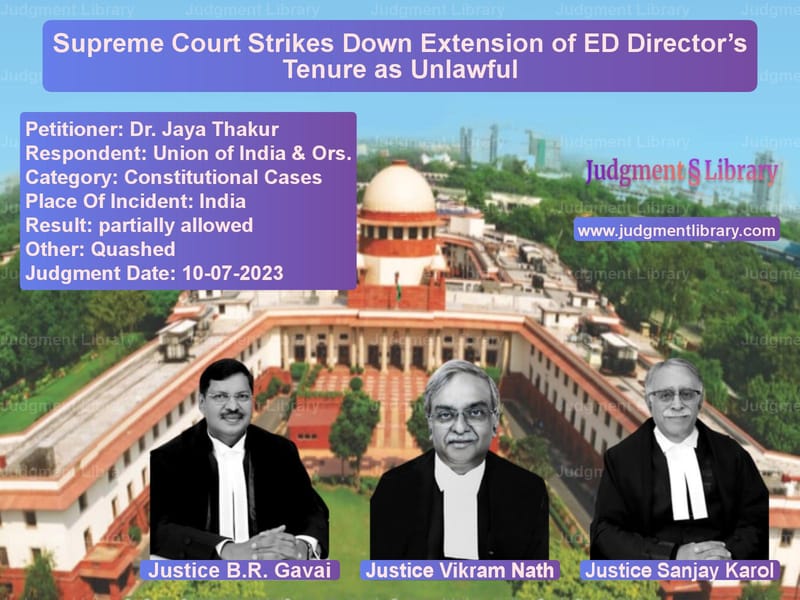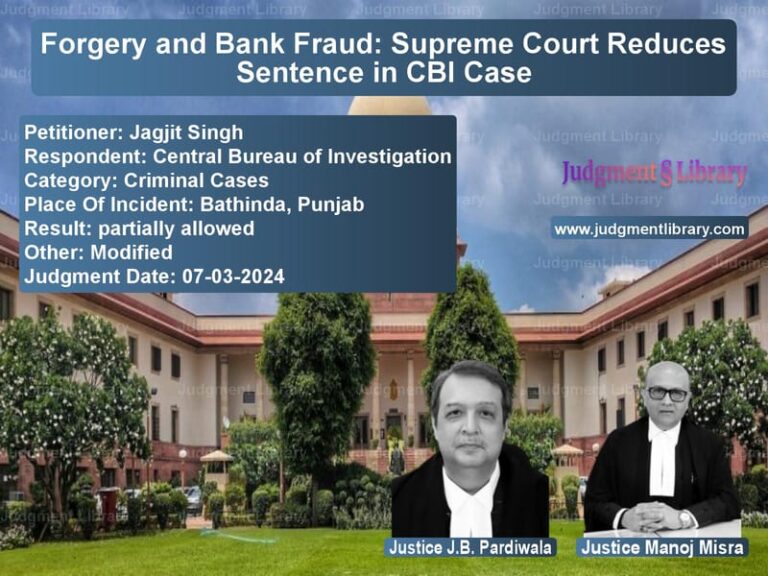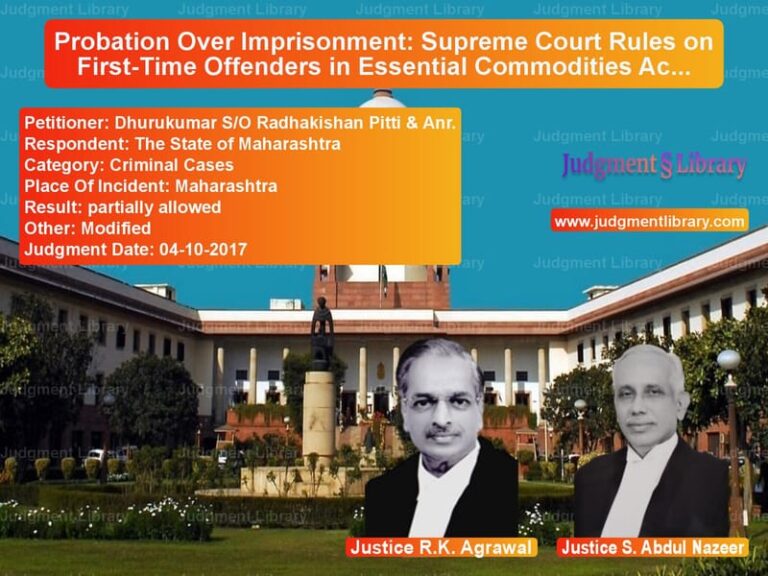Supreme Court Strikes Down Extension of ED Director’s Tenure as Unlawful
The Supreme Court in the case of Dr. Jaya Thakur v. Union of India & Ors. delivered a landmark judgment addressing the legality of extensions granted to the Director of Enforcement Directorate (ED), Sanjay Kumar Mishra. The Court found that the repeated extensions of his tenure violated previous judicial mandates and undermined institutional independence.
Background of the Case
The dispute arose when multiple writ petitions were filed challenging the extension of Sanjay Kumar Mishra’s tenure as the Director of ED. Initially appointed in November 2018 for a two-year term, his tenure was extended multiple times through government orders and legislative amendments.
The Supreme Court had earlier ruled in Common Cause v. Union of India (2021) that no further extensions should be granted to Mishra. However, in response, the Central Government amended the Central Vigilance Commission (CVC) Act, 2021 and the Delhi Special Police Establishment (DSPE) Act, 2021, enabling tenure extensions of up to five years.
Key Legal Issues
- Did the amendments to the CVC Act and DSPE Act violate constitutional principles?
- Was the extension of tenure for Sanjay Kumar Mishra legally justified?
- Did the government’s actions amount to nullifying a previous Supreme Court judgment?
Petitioner’s Arguments
The petitioners, represented by Senior Counsel Gopal Sankarnarayanan and Anoop G. Choudhary, argued:
- The extensions violated the Supreme Court’s previous ruling in Common Cause (2021), which explicitly prohibited further tenure extensions for the ED Director.
- Frequent extensions of tenure compromise the independence of the ED and allow the government to exert undue influence over the agency.
- Legislative amendments seeking to nullify judicial rulings violate the principle of separation of powers.
- The amendments allowed a ‘carrot and stick’ approach, whereby officials who complied with government directives were rewarded with tenure extensions.
- Appointments to high-ranking positions such as the ED Director should be insulated from political interference.
Respondent’s Arguments
The Central Government, represented by Solicitor General Tushar Mehta, defended the amendments:
- The extensions were in public interest and were made based on recommendations from a high-level committee.
- The amended laws did not violate any constitutional provisions.
- The Director’s continued tenure was crucial due to India’s ongoing Financial Action Task Force (FATF) review.
- The Supreme Court’s previous decision in Common Cause (2021) was based on an older legal framework, which was subsequently amended.
- The legislative amendments provided a valid legal basis for extending the ED Director’s tenure.
Supreme Court’s Observations
On Separation of Powers
The Court reaffirmed that legislative actions cannot nullify judicial mandates:
“The government cannot override a Supreme Court order through retrospective legislation that directly contradicts judicial directives.”
On Institutional Independence
The Court criticized the practice of extending tenure based on executive discretion:
“Frequent tenure extensions erode the independence of investigative agencies and create a dangerous precedent where officers may feel pressured to act in ways that secure their continued appointment.”
On the FATF Review Argument
The Court dismissed the government’s reliance on the FATF review:
“The FATF review extends beyond the tenure of the current ED Director. Justifying an illegal extension on this basis is misleading and unconvincing.”
Final Judgment
The Supreme Court ruled:
- The amendments to the CVC Act and DSPE Act were valid but could not be applied retrospectively to override judicial mandates.
- The extensions granted to Sanjay Kumar Mishra in November 2021 and November 2022 were illegal and quashed.
- However, the Court allowed Mishra to continue in office until July 31, 2023, to facilitate a smooth transition.
Implications of the Judgment
This ruling has far-reaching consequences for governance and legal accountability:
- Strengthening Institutional Integrity: The judgment reaffirms that independent agencies must not be subject to political manipulation.
- Clarifying Tenure Extensions: Future governments cannot use tenure extensions as a tool for exerting influence.
- Judicial Authority Upheld: The ruling emphasizes that legislative amendments cannot be used to circumvent court orders.
Conclusion
The Supreme Court’s decision in Dr. Jaya Thakur v. Union of India marks a significant victory for institutional autonomy and judicial supremacy. By striking down the unlawful extensions of the ED Director’s tenure, the Court has reinforced the importance of fixed-term appointments for critical investigative agencies. This judgment serves as a precedent in ensuring that the executive branch does not encroach upon judicial decisions through legislative maneuvering.
Petitioner Name: Dr. Jaya Thakur.Respondent Name: Union of India & Ors..Judgment By: Justice B.R. Gavai, Justice Vikram Nath, Justice Sanjay Karol.Place Of Incident: India.Judgment Date: 10-07-2023.
Don’t miss out on the full details! Download the complete judgment in PDF format below and gain valuable insights instantly!
Download Judgment: dr.-jaya-thakur-vs-union-of-india-&-ors-supreme-court-of-india-judgment-dated-10-07-2023.pdf
Directly Download Judgment: Directly download this Judgment
See all petitions in Public Interest Litigation
See all petitions in Legislative Powers
See all petitions in Separation of Powers
See all petitions in Judgment by B R Gavai
See all petitions in Judgment by Vikram Nath
See all petitions in Judgment by Sanjay Karol
See all petitions in partially allowed
See all petitions in Quashed
See all petitions in supreme court of India judgments July 2023
See all petitions in 2023 judgments
See all posts in Constitutional Cases Category
See all allowed petitions in Constitutional Cases Category
See all Dismissed petitions in Constitutional Cases Category
See all partially allowed petitions in Constitutional Cases Category







